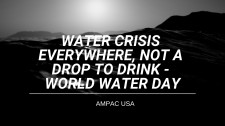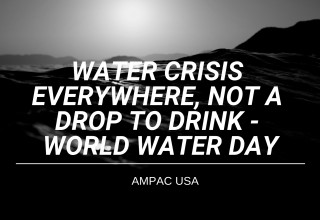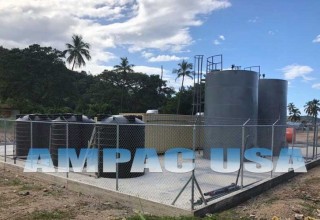
The need for better purification technologies has led the world to RO, which was a luxury 10 years ago. Today, companies have made the technology accessible to people from every walk of life at the lowest of costs. In this piece, the CEO of AMPAC USA, Sammy Farag, talks about the clear increase in the market for Reverse Osmosis Purifiers, which is owed to the pollution caused in sources of water around the world. This comes following multiple compromised sources of water that have put the health and lives of people around the world in danger.
LOS ANGELES, July 6, 2019 (Newswire.com) - Reverse Osmosis Purifiers are growing to be some of the most common appliances in households, next to ovens, refrigerators, televisions and washing machines. Ten years ago, having such an appliance was a luxury that many couldn’t afford, while others believed they didn’t need one. But in the last decade, pollution levels across the globe in water bodies has forced a majority of the public to see reason. Combined with new problems being uncovered each day, which include the Flint crisis in the U.S., water shortages and more, RO Systems have become more of a necessity.
According to the World Health Organization (WHO), 3.4 million people die every year due to the consumption of contaminated water. That is, one child dies every 21 seconds due to lack of a basic human need, water to drink. This, and the proximity to polluted sources, has catapulted the sales of RO purifiers over the years. Today, the market is growing at a steady, many would even say a rapid, rate.
“Today, who can safely say that they can trust every drop of water coming from the tap? Either the source is polluted or the treatment system at the point of supply is unreliable or the pipes are so old, they leak lead. It has greatly lowered the confidence we once had in the tap to give us a healthy drink for refreshment. RO gives everyone that security,” says Sammy Farag, CEO of AMPAC USA.
And it does reflect in the statistics.
In 2018 alone, the global water purifier market was valued at $31 billion. The figure is expected to reach $58.32 billion by 2025 at a CAGR of 9% between 2019 and 2025. What makes this growth possible though? It was found that numerous reasons, not limited to pollution itself, have led to such a steady increase and healthy forecast.
Reverse Osmosis
If we factor in increased contaminated sources, then reverse osmosis is a full-fledged, all-purpose solution. The concept of reversing the natural process of osmosis is when external pressure is applied on one side of a thin-film membrane that is semi-permeable. This pressure pushes solvent particles from one side to the other, leaving behind elements or solutes that once made up the concentration of the solution. When this procedure was first applied for the purification of water, it wasn’t exactly the answer. It took years of research and advancement in treatment technology to bring it here today, where it is an ideal option for any water treatment purpose. The years of experience in building this advanced tech has given RO the following benefits.
- It removes 98-99% contaminants, including organic and inorganic matter.
- It is effective against chemicals, TDS and suspended solids.
- It allows nothing more than a few minerals and water molecules through to the other side.
- It is a proven reliable method of pure safe drinking water.
- Today, it is more energy efficient than it was 10 years ago.
- Many models are automatic, meaning they require minimum manual interference.
- It comes at a great price.
“The advantages of reverse osmosis far outweigh its disadvantages. And most of these cons have already been taken care of, while others are still being worked at. With 30 years of experience in making whole-house to commercial and industrial grade water treatment systems, we have understood how RO systems can prove to be the ideal solution,” says Farag. “This is obviously the opinion of so many people who are buying it as a necessary part of their house instead of an option. Of course, beneficial deals and attractive prices are also the reason,” he adds.
The last point, especially, is drawing attention from experts worldwide. Lower prices and economic stability in the average family has led to an increase in the purchase rates.
Better Economic Conditions
When people have financial stability, it gets easier for them to invest in their health, as when there is an increase in disposable income in developing nations, purchasing power automatically increases. It can be related easily to the growth of the global purifiers market. The change has happened over several years and can be looked at widely, as given.
- As countries develop, the average family has a higher disposable income.
- This income allows them to invest in products other than basic needs, like food, water, clothing and shelter.
- More often than not, it is seen that health gets people's attention first. This is implied by expenditures on medicines, hygiene, quality of food and water.
- The families are, therefore, drawn to purchase purification systems for health reasons, which in turn, improves lifestyle.
And Farag agrees.
“In countries like China and Brazil, there has been a surge of disposable income. The biggest reason is that these countries have bridged the gap between demand and supply by creating jobs and providing people with the necessary skills to fulfill them. Manufacturing and service industries now have no vacancies in these countries thanks to the equipped personnel, thus giving them a chance to grow financially.”
This financial independence allows people to purchase purifiers, contributing to the growth of the market. People’s increased awareness of health and hygiene is also a key factor in this.
Research And Development
Major players in the global market have attained their position due to years of research and development on purification systems. The growth of the market is not only attributed to the increase in pollution of better incomes but also to the variety of options given to the consumer. Many renowned companies have invested resources in understanding and developing technologies that make the experience smoother and overcome the disadvantages previously associated with RO purifiers. Previously, it was very difficult to sell a single system, owing to their high maintenance, high power consumption, and costs. As the years passed by, better technologies substituted for these challenges and made the product experience better. AMPAC USA, one of these key players, feels the same.
“We have worked 30 years to make our average 3,4,5 - Stage Reverse Osmosis System what it is today. The biggest challenges we faced initially were, indeed, high cost, energy consumption, and regular maintenance. Listening closely to our consumers, we worked hard to create a product that is sustainable, requires less energy and has a lower need for manual interference. On top of that, we were able to achieve it at lower costs, which exponentially decreased the final price of the product. We took an idea and turned it into reality for our consumers, made it accessible for them,” said Farag.
So, does the drive for a better technology end here? Farag doesn’t think so.
“Yes, the market is at an all-time high, but there are still miles to go. We can achieve a better growth rate if we make this tech 100% sustainable and work on its challenges. The water-tech is currently under scrutiny for its inability to lower the rejection percentage. Additionally, it can potentially have huge environmental consequences to employ RO for large scale water productions. All of this still remains to be solved, but I believe we are on the way.”
Author’s Bio:
AMPAC USA is a leading manufacturer of advanced reverse osmosis treatment systems. For over 30 years, the company has been providing its customers and clients around the world solutions for their water treatment problems.
Source: AMPAC USA
Share:


